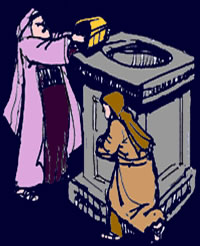
32nd Sunday in Ordinary Time Year B
Today’s reading from Mark’s gospel reminds us what a great teacher Jesus was. The object lesson he gives, as he watches people making their donations, is one of the best remembered stories of the world’s religious traditions – the ‘widow’s mite’ has become proverbial. Mark sharpens the lesson by linking this incident with what Jesus has to say about ‘scribes’ who ‘swallow the property of widows while making a show of lengthy prayers’. The situation of widows was insecure. The ‘scribes’, so often mentioned in the gospels, were interpreters of the Law of old Israel – the lawyers of the day. They benefited as trustees for the estates of widows, and a reputation for piety could be good for business. Jesus’ words, of course, have a lesson for all of us – people who make a selfish show of their piety, instead of making it a ‘secret’ they share with their heavenly Father (Mt 5:6), give Christianity a bad name.
Mark gives the little widow a privileged place in his telling of the story of Jesus. Having entered Jerusalem to meet his fate, Jesus is giving his final instructions concerning the discipleship to which he is calling those who wish to follow him. Using the widow’s example, he goes to the very heart of the matter – a giving that counts. Is there any more telling way of expressing the fundamental truth, that as responsible persons we are made in the image of God, than by unselfish giving to others? The most precious things in life - in our family, in the community in which we live – come through the selfless generosity with which we give to others. We know from experience that it is a giving that costs us something that brings real happiness to ourselves and to those around us.
Mark is linking the generous giving of the widow with the great drama of God’s generosity soon to take place – as Jesus gives himself into the hands of his Father for the sake of the whole human family. Our liturgy takes up Mark’s lesson. Today’s reading from Hebrews – a central passage in this great treatise – explains how the ritual of old Israel was only a foreshadowing of the Saviour’s Paschal Mystery. The old sacrifices, offered time and again - in a ‘man made’ temple that was only a model of God’s dwelling place, and making use of the blood of animals - have now given way to the world’s final act of worship. The Saviour enters ‘the actual presence of God on our behalf’, making a gift of himself ‘once and for all’. He shows us how true it is that a giving that really counts brings true blessings – in his total gift of himself he has become the source of all the blessings that will fill our eternity.
John Thornhill sm

